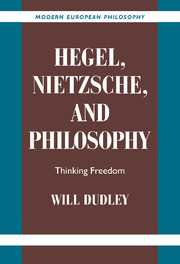Book contents
- Frontmatter
- Contents
- Acknowledgments
- List of Texts, Translations, and Abbreviations
- Introduction: Freedom and Philosophy
- PART I FREEDOM IN AND THROUGH HEGEL'S PHILOSOPHY
- PART II FREEDOM IN AND THROUGH NIETZSCHE'S PHILOSOPHY
- 5 The Place of Freedom in Nietzsche's Philosophy
- 6 The Freedom of Willing: Decadence and Nobility
- 7 Freedom beyond Willing: From Nobility to Tragedy
- 8 Freedom through Nietzsche's Philosophy
- Conclusion: Philosophy and Freedom
- Notes
- Index
8 - Freedom through Nietzsche's Philosophy
Published online by Cambridge University Press: 09 July 2009
- Frontmatter
- Contents
- Acknowledgments
- List of Texts, Translations, and Abbreviations
- Introduction: Freedom and Philosophy
- PART I FREEDOM IN AND THROUGH HEGEL'S PHILOSOPHY
- PART II FREEDOM IN AND THROUGH NIETZSCHE'S PHILOSOPHY
- 5 The Place of Freedom in Nietzsche's Philosophy
- 6 The Freedom of Willing: Decadence and Nobility
- 7 Freedom beyond Willing: From Nobility to Tragedy
- 8 Freedom through Nietzsche's Philosophy
- Conclusion: Philosophy and Freedom
- Notes
- Index
Summary
We have seen that the tragic soul is necessary to freedom, and we have considered many of the prerequisites for this soul's emergence. Such a soul must combine modernity and nobility, amnesia and memory, the abilities to impregnate and to give birth to herself. Such a soul must be courageous, skeptical, and forceful. Such a soul must be unsittlich and experimental, yet whole, a monstrous multiplicity. Such a soul must be an infinite melody and a swimmer. Above all, such a soul must have great health: she must be able to affirm the world out of overfullness, loving the fated eternal return of chaos at the same time that she loves the current construction of the world and herself enough to wish that it were their fate to return eternally.
But all of these prerequisites are themselves conditioned by a further prerequisite, which is therefore itself a condition upon which the tragic spirit, redemption, and liberation depend: the tragic soul must have available to her a kind of language through which she can experience the world tragically, and in which she can communicate her tragic spirit and great health to others.
For Nietzsche, then, freedom depends on the emergence of a kind of language capable of facilitating the transition from the noble to the tragic. The ultimate condition of freedom is therefore the practice of those activities that enable tragic language to emerge.
- Type
- Chapter
- Information
- Hegel, Nietzsche, and PhilosophyThinking Freedom, pp. 213 - 226Publisher: Cambridge University PressPrint publication year: 2002



